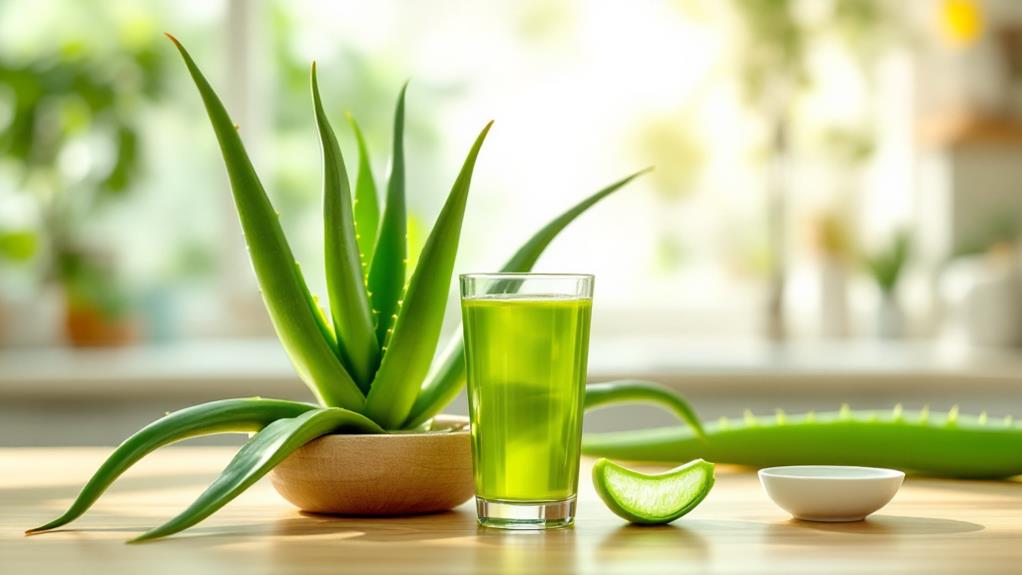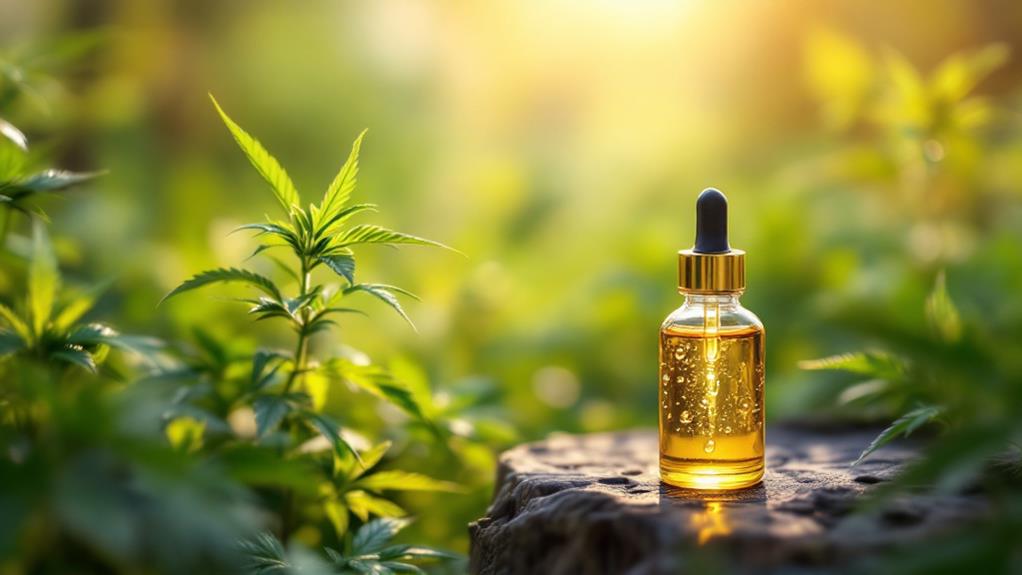Everything You Need to Know About Aloe Vera: Health Benefits and Uses

Aloe vera, revered since ancient Egypt, is a versatile plant packed with over 75 active ingredients that enhance health. It's great for your skin, speeding up burn recovery and soothing sunburns. Drinking aloe vera juice can aid digestion without adding calories or sugar to your diet. It's also beneficial for oral hygiene; its antibacterial properties help combat plaque and gingivitis. Some studies suggest it may help manage blood sugar levels in type 2 diabetes. Topical use is safe with a patch test, but use internally with caution. Investigate more to uncover aloe vera's full potential.
Historical Significance of Aloe Vera
Delving into the historical significance of aloe vera, you'll find that this remarkable plant has been cherished for thousands of years for its therapeutic properties. The ancient Egyptians, in particular, held aloe vera in high esteem, referring to it as the "plant of immortality." They incorporated it into their burial rituals and medicinal practices, illustrating its integral role in their culture. This is further evidenced by its mention in the Ebers Papyrus, an ancient Egyptian medical text dating back to 1550 BC, which highlights its use in wound healing and skin care.
Beyond Egypt, aloe vera's healing properties were recognized in traditional medicine across diverse cultures. In China, India, and Greece, healers and practitioners utilized the plant for its renowned ability to soothe and treat numerous ailments. Its historical significance is underscored by its longstanding reputation as a remedy for skin conditions and burns, underscoring its therapeutic versatility.
Key Nutritional Components
In exploring the key nutritional components of aloe vera, you'll uncover a powerhouse of over 75 active ingredients that contribute considerably to its health benefits. Aloe vera is packed with vitamins and minerals, such as calcium, sodium, and potassium, all vital for maintaining your body's balance. An 8-ounce serving of pure aloe vera juice is a low-calorie option, providing just 10 calories, with 2 grams of carbohydrates and 1 gram of fiber. This makes it a great choice if you're watching your calorie intake.
Aloe vera juice is not only low in calories but also low in sugar, containing 0 grams, which is excellent if you're monitoring your sugar consumption. The gel from aloe vera contains bioactive compounds that may aid in digestion, promoting a healthy gut. These compounds also offer anti-inflammatory effects, which can contribute to general health.
Vitamins and antioxidants present in aloe vera further improve its health benefits, supporting your body's natural defenses. By integrating aloe vera into your diet, you can enjoy its numerous nutritional components, which work together to support digestion and help maintain your general well-being.
Skin Healing Properties

Beyond its impressive nutritional components, aloe vera is also renowned for its skin healing properties. When you apply aloe vera gel topically, it can markedly speed up burn healing time—by about nine days according to some studies. This makes it a reliable choice for addressing minor burns and injuries. Aloe vera's anti-inflammatory properties help reduce redness, swelling, and irritation, making it an effective option for soothing skin ailments.
The U.S. Pharmacopeia even recognized aloe vera as a skin protectant in the early 19th century, underscoring its long-standing reputation in wound care. If you're looking for sunburn relief, aloe vera can offer comfort by alleviating pain and itching while promoting skin recovery. Its antibacterial properties make it especially useful for acne treatment, helping reduce pimples and prevent infections in existing blemishes.
Here are some key benefits of aloe vera for skin healing:
- Burn healing: Speeds up recovery time for minor burns.
- Skin protectant: Recognized historically for wound care.
- Sunburn relief: Soothes pain and itching effectively.
- Acne treatment: Reduces pimples and prevents infections.
- Anti-inflammatory properties: Alleviates redness and swelling.
Incorporate aloe vera into your skincare routine to harness these benefits.
Benefits for Oral Health
Aloe vera isn't just beneficial for skin; it also offers remarkable advantages for oral health. You might be surprised to learn that aloe vera can be a powerful ally in your oral care routine. Its antibacterial properties make it effective against harmful bacteria like Streptococcus mutans, which are notorious for causing cavities. By incorporating aloe vera into your oral hygiene, you can help prevent tooth decay and gum disease naturally.
Using aloe vera gel as a mouthwash is a smart choice. Studies have shown that it's just as effective as chlorhexidine in reducing plaque and gingivitis. This makes it a fantastic natural alternative to chemical-laden options. Plus, if you struggle with mouth ulcers, aloe vera can offer relief. Research from 2022 highlighted its ability to speed up healing and lessen the pain of canker sores, outperforming some traditional treatments.
Furthermore, aloe vera gel has shown efficacy against Candida albicans in the mouth, helping to maintain your oral hygiene and prevent infections. So, regardless of if you're looking to tackle plaque, soothe ulcers, or combat infections, aloe vera has got you covered in the oral health department.
Aloe Vera in Digestion

Have you ever considered how aloe vera can improve your digestive health? Aloe vera is more than just a soothing skin treatment; it's a powerful ally for your digestion. The gel within aloe vera contains bioactive compounds that reduce inflammation in the gut, helping to address gastrointestinal issues. If you suffer from irritable bowel syndrome (IBS), you might find relief as aloe vera can help manage its symptoms. Some studies also suggest that it can inhibit the growth of H. pylori bacteria, a common cause of stomach ulcers.
Aloe vera juice acts as a natural laxative due to compounds like aloin, promoting regular bowel movements. However, it's essential to consume it in moderation to avoid potential side effects. Adding aloe vera juice to your regimen could be advantageous as it offers health benefits without adding extra calories.
Here's how aloe vera supports your digestion:
- Alleviates gastrointestinal issues by reducing gut inflammation.
- Manages IBS symptoms effectively.
- Acts as a natural laxative, promoting regularity.
- Improves gut flora balance for enhanced digestive health.
- Supports low-calorie consumption while providing digestive benefits.
Safety and Precautions
While aloe vera offers impressive digestive benefits, you should be mindful of its use to guarantee your safety. In terms of topical use, it's generally safe, but performing a patch test is essential to avoid potential allergic reactions. Apply a small amount on a discreet area of your skin and wait 24 hours to confirm you don't experience any irritation before using it more widely.
For oral consumption, particularly aloe vera latex, caution is advised. High doses can lead to adverse effects like abdominal cramps, diarrhea, kidney damage, and electrolyte imbalances. It's significant to adhere to recommended dosage guidelines for internal use and limit duration to prevent these issues.
If you're pregnant, breastfeeding, or under 12, avoid internal use of aloe vera without consulting a healthcare professional due to potential risks. Furthermore, if you're taking medications or have existing health conditions, discuss with your healthcare provider before using aloe vera. It could interact with certain medications or worsen specific health problems. By taking these safety precautions seriously, you can enjoy aloe vera's benefits while minimizing risks and safeguarding your well-being.
Ongoing Research Insights

Exploring the latest findings reveals aloe vera's growing potential in multiple health applications. Ongoing research shines a light on aloe vera's impressive health benefits, particularly in enhancing skin health and oral health. For instance, studies have shown its ability to improve healing rates in burn wounds, sometimes outperforming standard treatments. Clinical trials are also examining its role in managing irritable bowel syndrome (IBS), though results are mixed, indicating both potential benefits and areas for further study.
Recent studies suggest aloe vera may positively impact oral health. When incorporated into mouthwashes, it effectively reduces plaque and gingivitis. Additionally, its antioxidant properties are under investigation for skin health, with indications that it can protect against UV damage and photoaging.
Here's what the ongoing research reveals about aloe vera:
- Improved healing rates: Aloe vera may expedite recovery for burn wounds.
- Irritable bowel syndrome: Mixed results in managing IBS symptoms.
- Oral health: Reduction in plaque and gingivitis through aloe-infused mouthwashes.
- Antioxidant properties: Potential protection from UV damage and photoaging.
- Diabetes management: Promising in controlling blood sugar levels in type 2 diabetes.
These insights underscore aloe vera's vast potential and areas ripe for further exploration.




